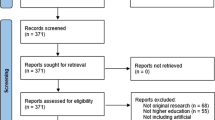Abstract
With the content analysis method, this paper uses statistic evidence and analysis of the discourses in Harvard Educational Review (HER) from 1931 to 2000 to discuss the transformation of educational research, which has turned from “teaching object” to “teaching subject”. What is more, education research is not only aimed at pursuing the efficiency of teaching, but also showing more concern for the individuals in the process of teaching.
Similar content being viewed by others
References
Beck R (1973). White House conferences on children: an historical perspective. Harvard Educational Review, 43(4): 653–688
Brenzel B M (1980). Domestication as reform: a study of the socialization of wayward girls, 1856–1905. Harvard Educational Review, 50(2): 196–213
David K, Lloyd E O, et al (1974). The right of children—Part II. Harvard Educational Review, 44(1): 56–59
Ding X M (2001). Commentary on educational reform in America after World War Two. Journal of Southwest Guizhou Teachers College for Nationalities, (1): 37–39 (in Chinese)
Edelman P B (1973). The Massachusetts task force reports: advocacy for children. Harvard Educational Review, 43(4): 639–652
Fairbanks C M (1992). Labels, literacy, and enabling learning: Glenn’s story. Harvard Educational Review, 62(4): 475–493
Green E, Morse J F, et al (1963). Student loan programs. Harvard Educational Review, 33(3): 360–378
Johnson B M (1993). Giving voice to voiceless. Harvard Educational Review, 63(1): 85–104
Johnson S M (1980). Performance-Based staff layoffs in the public schools: implementation and outcomes. Harvard Educational Review, 50(2): 175–185
Johnson S M (1984). Merit pay for teachers: a poor prescription for reform. Harvard Educational Review, 54(2): 214–233
Lensmire T J (1994). Writing workshop as carnival: reflections on an alternative learning environment. Harvard Educational Review, 64(4): 371–391
Liang H M, Wang J Y (2002). The teacher evaluation strategy based on student achievements in Amercia. Journal of Teaching and Management, (9): 78–80 (in Chinese)
Lu X F, Bao W Y (2002). The reform and development trend of teacher evaluation in America. Education Exploration, (10): 93 (in Chinese)
Marilyn Cochran-Smith (1991). Learning to teach against grain. Harvard Educational Review, 61(3): 279–310
McDonald J P, Delpit L D, et al (1986). Teachers, teaching, and teacher education—teachers reflect on practice. Harvard Educational Review, 56(4): 349–526
Murnane R J, Cohen D K (1986). Merit pay and evaluation problem: why most merit pay plans fail and a few survive. Harvard Educational Review, 56(1): 1–17
Murnane R J, Singer J D, et al (1989). The influences of salaries and ‘opportunity costs’ on teachers’ career choices: evidence from North Carolina. Harvard Educational Review, 59(3): 325–346
Newmann F M (1981). Reducing student alienation in high schools: implications of theory. Harvard Educational Review, 51(4): 546–564
Pedersen E (1978). Therese Annette Faucher with William W. Eaton: a new perspective on the effects of first-grade teachers on children’s subsequent adult status. Harvard Educational Review, 48(1): 1–31
Pressey S B F (1979). Program teaching and teaching machine. Beijing: People Education Press, 84; 84; 103 (in Chinese, Liu F trans.)
Rodham H, Grinspoon L, Singer S B, et al (1973). The Rights of Children—Part I. Harvard Educational Review, 44(4): 481–702
Rulon P J, et al (1943). A comparison of phonographic recordings with printed material in terms of knowledge gained through their use alone. Harvard Educational Review, 13(1): 63–76
Rulon P J, et al (1943). A comparison of phonographic recordings with printed material in terms of knowledge gained through their use in a teaching unit. Harvard Educational Review, 13(2): 163–175
Rulon P J, et al (1943). A comparison of phonographic recording with printed material in terms of motivation to further study. Harvard Educational Review, 13(3): 246–255
Shapiro E (1963). Long-term student loans: a program for repayment according to ability to repay. Harvard Educational Review, 33(2): 186–207
Thomas D W (1985). The Torpedo’s touch. Harvard Educational Review, 55(2): 230–268
Zhao Z J (1996). Student Loan in college. Chengdu: Sichuan Education Publishing House, 106 (in Chinese)
Author information
Authors and Affiliations
Corresponding author
Additional information
Translated from Jiaoyu Fazhan Yanjiu 教育发展研究 (Exploring Education Development), 2005, (12): 53–56
Rights and permissions
About this article
Cite this article
Du, X. The transformation of the focus of educational research from “teaching object” to “teaching subject”: a case study of Harvard Educational Review . Front. Educ. China 2, 273–285 (2007). https://doi.org/10.1007/s11516-007-0023-x
Issue Date:
DOI: https://doi.org/10.1007/s11516-007-0023-x




